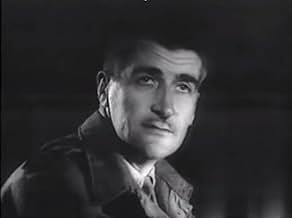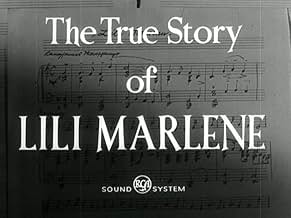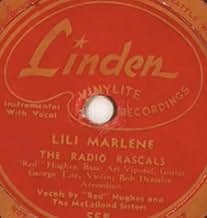Ajouter une intrigue dans votre langueHow Lili Marlene became the signature tune for the British army in North Africa.How Lili Marlene became the signature tune for the British army in North Africa.How Lili Marlene became the signature tune for the British army in North Africa.
Humphrey Jennings
- Hans Leip
- (uncredited)
Dorit Talmadge
- Singer
- (uncredited)
Histoire
Le saviez-vous
- AnecdotesLucie Mannheim was married to Marius Goring from 1941 until her death in 1976.
- Citations
Marius Goring - On-Screen Narrator: When the fighting men come home, they bring with them trophies and souvenirs of the war, the Second World War. But There's one trophy that you will only find in the homes of the Eighth Army - the disc of a German song: Lili Marlene.
- Générique farfeluIn this reconstruction of the story of LILI MARLENE we have had the collaboration of a great number of people, particularly Eighth Army men, London dockworkers, radio experts and refugees from Fascism. Some have brought us information, others re-enacted scenes from the past, others again appear in the picture as themselves.
Commentaire en vedette
Unless records remain of the discussions leading to the making of this film we can only guess at what its aims were. Comparatively expensively made with many staged scenes it appears heavily indeed entirely propagandistic both crudely and in more subtle ways.
The song emerged when it was broadcast to German troops during WW2 and became an enormous entirely unanticipated hit. British troops fighting abroad heard it on these German broadcasts and most remarkably it became a hit with both sides of the conflict. The song itself is sentimental and wistful and, having as its subject a woman, Lili Marlene, presumably reminded both German and British soldiers of wives and girlfriends left behind at home. These deep emotions evoked by the song presented propaganda opportunities, it also presented dangers.
In the early stages of the war when German morale was high such a sentimental song presumably was judged to be comforting for their troops hence their immense exploitation of it as the film makes clear. As the war turned and huge and bitter defeats replaced easy victories, such sentimental reminders of a homeland and loved ones that many increasingly believed - rightly - that they were never to see again would have been deeply damaging to morale. The film makes this point explicitly and with much detail, also the enormous extent to which the Nazis had at first exploited its popularity only to abruptly banish song and singer when their fortunes began to turn.
The bond the song had formed with British troops presented an opportunity to the Germans and consequent danger to the allied war effort in that there must have been considerable curiosity on the part of British troops as to its the origin as well as to the identity of the singer. The Nazis could have greatly exploited this vacuum by producing a calculated propagandistic version of the song's origin and the identity of the singer also to give it new English words in order to redirect and manipulate this curiosity and the song's allure to British troops.
Instead the film preempts this by doing exactly the same thing but in the reverse direction by giving its own (British) version of the history of the song including the fate of the young singer - we see her interned in a concentration camp. The film concludes with a re-worded rousing defiant version of the song in English, mocking Hitler and referring to those same women in German hearts who had now become "hollow-eyed widows and mothers" and looked at the Fuehrer in deepest bitterness.
The film ends with a morale-raising entirely fictional vision of an immediate post-war East End of London (the most extensively bombed in the country?) street market with house and shop lights ablaze and barrows piled high with oranges and bananas, where the tune is played for the last time (on a barrel-organ - the most evocative East London street sound) finally claiming British ownership of it as a song of hope and peace
The song emerged when it was broadcast to German troops during WW2 and became an enormous entirely unanticipated hit. British troops fighting abroad heard it on these German broadcasts and most remarkably it became a hit with both sides of the conflict. The song itself is sentimental and wistful and, having as its subject a woman, Lili Marlene, presumably reminded both German and British soldiers of wives and girlfriends left behind at home. These deep emotions evoked by the song presented propaganda opportunities, it also presented dangers.
In the early stages of the war when German morale was high such a sentimental song presumably was judged to be comforting for their troops hence their immense exploitation of it as the film makes clear. As the war turned and huge and bitter defeats replaced easy victories, such sentimental reminders of a homeland and loved ones that many increasingly believed - rightly - that they were never to see again would have been deeply damaging to morale. The film makes this point explicitly and with much detail, also the enormous extent to which the Nazis had at first exploited its popularity only to abruptly banish song and singer when their fortunes began to turn.
The bond the song had formed with British troops presented an opportunity to the Germans and consequent danger to the allied war effort in that there must have been considerable curiosity on the part of British troops as to its the origin as well as to the identity of the singer. The Nazis could have greatly exploited this vacuum by producing a calculated propagandistic version of the song's origin and the identity of the singer also to give it new English words in order to redirect and manipulate this curiosity and the song's allure to British troops.
Instead the film preempts this by doing exactly the same thing but in the reverse direction by giving its own (British) version of the history of the song including the fate of the young singer - we see her interned in a concentration camp. The film concludes with a re-worded rousing defiant version of the song in English, mocking Hitler and referring to those same women in German hearts who had now become "hollow-eyed widows and mothers" and looked at the Fuehrer in deepest bitterness.
The film ends with a morale-raising entirely fictional vision of an immediate post-war East End of London (the most extensively bombed in the country?) street market with house and shop lights ablaze and barrows piled high with oranges and bananas, where the tune is played for the last time (on a barrel-organ - the most evocative East London street sound) finally claiming British ownership of it as a song of hope and peace
- trimmerb1234
- 18 août 2008
- Lien permanent
Meilleurs choix
Connectez-vous pour évaluer et surveiller les recommandations personnalisées
Détails
- Durée29 minutes
- Couleur
- Mixage
- Rapport de forme
- 1.37 : 1
Contribuer à cette page
Suggérer une modification ou ajouter du contenu manquant










